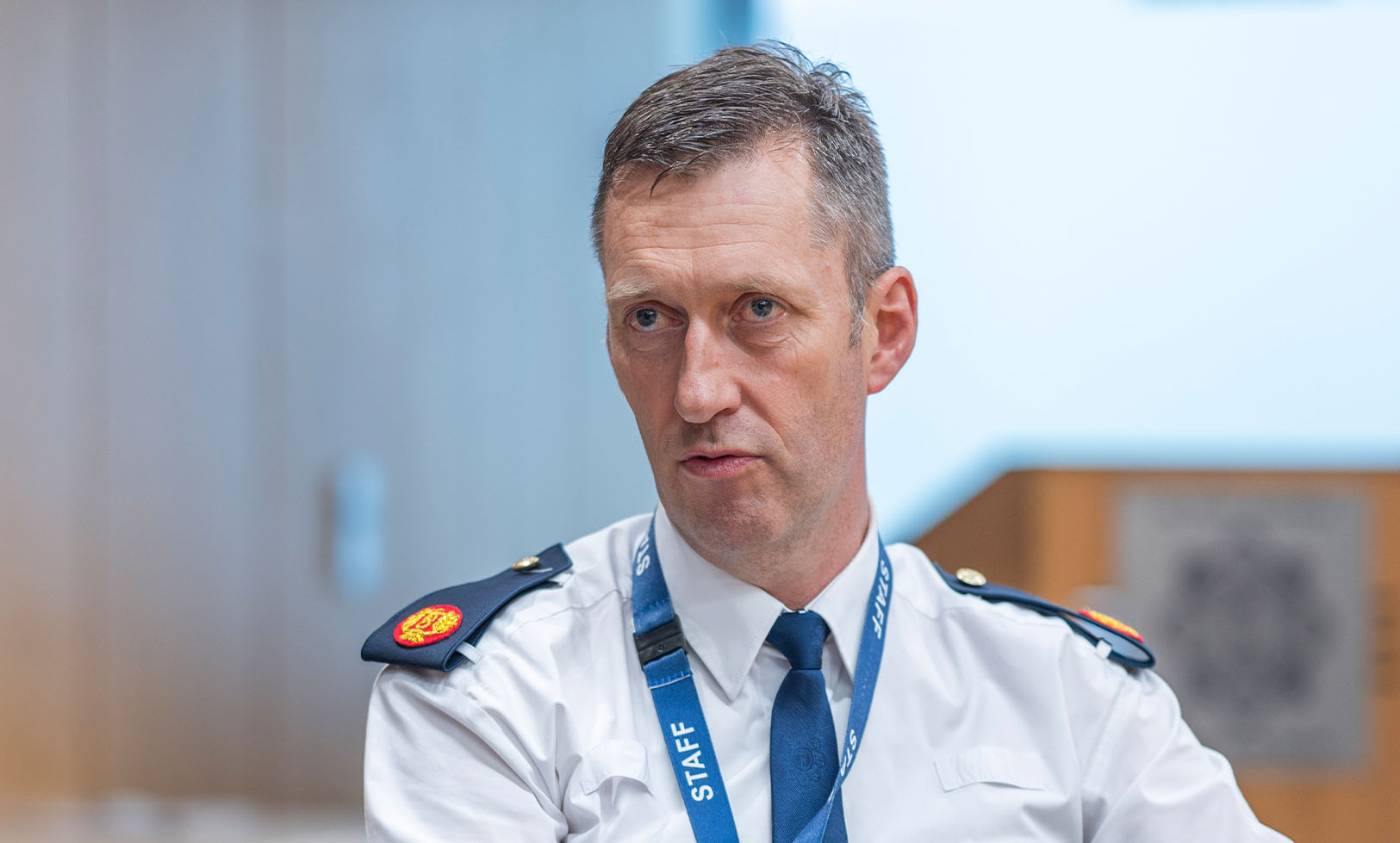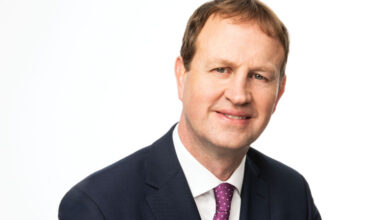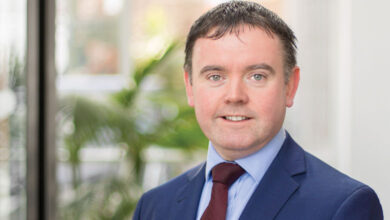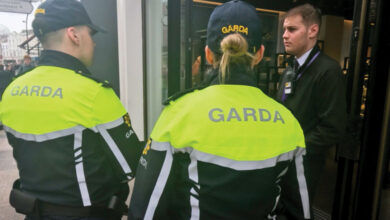Garda Assistant Commissioner Justin Kelly: Policing organised and serious crime
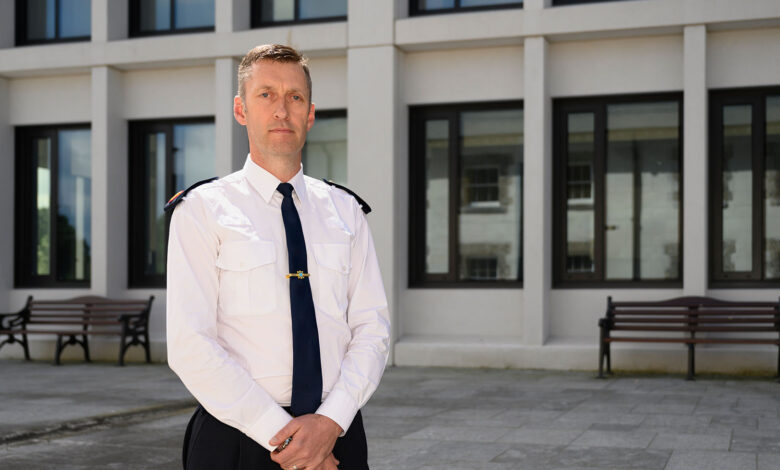
Ciarán Galway visits Walter Scott House to discuss policing priorities, talent management, leadership, and ambition with An Garda Síochána’s (AGS) Assistant Commissioner for Organised and Serious Crime (OSC), Justin Kelly.
Named after an Honorary Commissioner of the New York City Police who, in 1923, presented An Garda Síochána with a $1,000 gold bond (which would perpetually fund the gold Scott Medal for Valor), Walter Scott House was officially opened in November 2022.
A stone’s throw from Heuston Station in Dublin 8, the ultra-modern building is home to most of the specialised national bureaux under the Organised and Serious Crime umbrella.
Heading up Organised and Serious Crime, Kelly is now in his 32nd year of service with An Garda Síochána and was appointed to his current role as Assistant Commissioner in May 2022.
A native of Dublin, Assistant Commissioner Kelly served as a frontline Inspector in Blanchardstown and Clondalkin in Dublin, then as a Detective Inspector in the Drugs and Organised Crime Bureau before ascending to the rank of Detective Superintendent in the Garda National Protective Services Bureau, and most recently served as Detective Chief Superintendent, in the AGS’s Special Detective Unit.
“Previously, I had worked in several areas across the organisation at different ranks. Upon being appointed Assistant Commissioner, I was struck by the quality of expertise we have working within OSC across all the different ranks,” he observes.
Reflecting on his career trajectory, Kelly expresses a preference for operational service. “As is the case in any organisation, the more senior you become, the further you move away from operational activity,” he says, adding: “However, I am lucky in that all the units within OSC are operational in nature. As such, while I do not have the same level of input in operational activity, I still have considerable understanding of what is going on in the organised crime area both nationally and internationally. That is somewhat unique relative to the roles of other assistant commissioners.”
Equipped with nine postgraduate qualifications, including three master’s degrees, the Assistant Commissioner places significant emphasis on education and specialist training.
“I have been fortunate to have had several of these qualifications supported by An Garda Síochána, for instance, a master’s in criminal justice from John Jay College of Criminal Justice in New York City. That was particularly useful in gaining perspective beyond AGS and Ireland,” he says.
“Completing an MBA at Dublin City University was hugely significant from a personal development perspective, and most recently I completed the Strategic Command Course at the College of Policing in the UK.”
Evolution of policing
Reflecting on the evolution of policing over the last three decades, Kelly remarks that the change is “immeasurable”. “When I started frontline policing in 1993, how we were trained and equipped was relatively basic. Previously we would not have had a nuanced understanding of particular crimes, such as domestic violence and child sexual abuse. There was little external oversight but there has been a sea change in policing since then,” he recalls.
“Unlike today, professional development was partially down to circumstances. I was lucky, for instance, in that when I started in Tallaght, I had some exceptionally strong leaders and mentors. When I think back to specific role models, Andy Callanan comes to mind. He was a Sergeant when I started out and was murdered in Tallaght Garda Station in 1999. We recently remembered the 25th anniversary of his death at our annual memorial day in Dublin Castle.
Strategic priorities
Within Kelly’s OSC remit, there are around 1,000 people working across eight bureaux:
- Garda National Bureau of Criminal Investigation;
- Garda National Cyber Crime Bureau;
- Garda National Drugs and Organised Crime Bureau;
- Garda National Economic Crime Bureau;
- Garda National Immigration Bureau;
- Garda National Protective Service Bureau;
- Garda Technical Bureau; and
- Operational Support Services.
Within this enormous remit, each of the bureaux have their own specific priorities and the Assistant Commissioner offers a snapshot of some of the work being undertaken.
Firstly, when people think of organised crime, they most commonly call to mind the work of the Garda National Drugs and Organised Crime Bureau. “Its major focus is preventing the circulation of illegal firearms and the importation of controlled drugs, particularly cocaine, into the State. In recent years, this focus has revolved around investigating and disrupting organised criminal groups, thwarting their targeting of rivals, and the associated murders,” he explains.
In the sphere of cybercrime and cyber dependent crime, a major challenge is ensuring that the technology and training deployed by AGS keeps pace with developments in cyber threats. “Cybercrime requires constant vigilance because if we do not stay on top of it, the implications are extremely costly, not just for individuals and businesses, but for the State itself. From that perspective, we must retain the right expertise in the Garda National Cyber Crime Bureau,” the Assistant Commissioner asserts.
In the context of the establishment of the Garda National Protective Service Bureau, there have been significant developments in work to protect the vulnerable, particularly women and children, over the past decade. “We still have so much more work to do, particularly in the area of domestic violence,” Kelly acknowledges, adding: “Another major challenge we have relates to online child exploitation given the explosion in the frequency of cases that we are observing.
“For us, the most significant risk in the online child exploitation reports we receive is that sometimes that content involves Irish children. The identification of those children is a key priority for us.”
Given the breadth of his remit, there is an obvious and perhaps inevitable challenge around resource allocation across the competing demands within An Garda Síochána. Currently, this is exacerbated by events such as rioting in Dublin in late 2023, increasing street protests, and challenges relating to immigration.
“Immigration, specifically offences relating to illegal immigration and deportation, is another area which requires my increasing attention. That has become hugely topical with a significant influx of people seeking international protection in Ireland,” the Assistant Commissioner says.
Borderless crime
Today, almost every serious crime type is transnational in nature, most obviously cybercrime, human trafficking, organised prostitution, and the importation of controlled drugs. “These crimes have connections to transnational organised crime groups all over the world, alongside non-state actors who have the potential to harm Ireland’s critical infrastructure from across the world,” he explains.
“However, unlike our geography, policing in Ireland is not an island. The only way that we can confront transnational crime is to work with partners such as Europol, Interpol, Frontex, and MAOC-N, which assists us in relation to maritime drug interdictions.
Similarly, AGS works very closely with its counterparts in the UK, including the National Crime Agency, as well as participating in daily interactions with the PSNI in the North. “Each week, we have people from the different bureaux across OSC working abroad, involved in joint investigation teams across Europe. Likewise, we often host personnel from external partners or international police forces, to work towards shared objectives.”
Cocaine
Despite significant seizures made by AGS and Revenue, there is no shortage of cocaine in Ireland. Explaining the prevalence of the drug, which chiefly emanates from South America, Kelly bluntly states: “Consumption drives demand.”
“According to United Nations Office on Drugs and Crime figures, Ireland’s consumption of cocaine is joint fourth highest in the world as a percentage of the population,” he outlines, elaborating: “So, on one hand you have significant demand for cocaine in Ireland and on the other you have – for various geopolitical reasons – massive supply in south America.”
With Europe the number one market for cocaine globally, the logistical challenge for drug cartels in south America is transporting it from A to B, and, in Ireland’s case, landing it on the island. This is the vector by which the drug interdictions operations of AGS can have a major impact.
“The effect of policing is reflected in fluctuations in the wholesale price of cocaine and its availability in correlation with our successes. At various times, we have observed that tangible impact.
“The overarching objective of the National Drugs and Organised Crime Bureau is to make Ireland as hostile an environment as possible for the importation of controlled drugs. We try to make it as difficult as we can.”
Emphasising the time and effort that is invested in successful drug interdiction operations which have resulted in 10s and sometimes 100s of kilograms of drugs being seized, Kelly stresses: “What eolas Magazine readers see on the Six One news is simply the sharp end of drug interdiction operations – where we actually intercept and arrest people – however, most of the work has already taken place over several months and involved hundreds of people.
“International relations can be a significant aspect of this, particularly in relation to the sharing of information between our partners in the NCA and the DEA in the UK and US, respectively. The networks that our international law enforcement partners have is vast, so we try to leverage them as much as possible.”
Organised crime groups
While two major organised crime groups (OCGs) have dominated the public consciousness since a feud erupted between them in 2015, Kelly emphasises that the organised crime landscape is much broader, with other sophisticated OCGs emerging.
“We have different OCGs at varying levels of sophistication. Some of these specialise in particular crime areas, while others span across several different crime areas. However, any of the groupings that are in any way significant are international in nature. They have the capacity to move money, product, and people transnationally,” he explains.
AGS’s focus is on identifying all the groupings and conducting a threat assessment of each one in order the prioritise resource allocation. “That helps us focus our strategies on which OCGs we will target. That changes all the time,” the Assistant Commissioner says, adding: “We are undertaking a lot of work with Europol around organised crime threat assessments. Among the trends identified by Europol are prevalence of Irish OCGs. They are the ones in which we are most interested.
“There will always be more people committing crime than there are police personnel. As such, we must deploy our resources intelligently. That is determined by the level of threat posed by a particular OCG to society.”
Avoiding reference to any specific OCG, Kelly emphasises the “significant inroads” made into investigating and disrupting highest risk organised and serious crime in recent years, particularly in relation to high-profile threat to life (TTL) operations.
“At our peak, we were running TTL operations on a weekly basis amid feuding between OCGs. For AGS, that means running major surveillance and armed response operations. In 2024, the frequency of these operations is greatly reduced. We interpret that as an indicator of our success and a demonstration that we have degraded the abilities of the relevant OCGs.
“From top to bottom, we have incarcerated individuals organising, facilitating, and directing assassinations, as well as the potential murderers themselves. There are many people serving sentences for such crimes, some of them of very lengthy,” he asserts.
Talent management and recruitment
Given the skilled nature of many of the roles across the OSC bureaux, talent retention is a challenge. “Within AGS, we invest considerable time and money on training people up to the highest standards. Given that their skillsets are sought after, this talent is then headhunted by private entities or even other public service bodies.
“At a senior leadership level, we have undertaken significant work with our HR department around talent retention. Unfortunately, in the public service, there is a limit to what we can do relative to the private sector. But we are working hard to avoid losing people to alternative careers,” Kelly acknowledges.
Resourcing and leadership
Conceding that there are several units within OSC’s remit that are functioning below optimal strength, the Assistant Commissioner is keen to consolidate their operational capacity. “We must determine what strength is required and get to that point. That is a constant priority,” he notes.
“The Garda Commissioner [Drew Harris] is incredibly supportive of OSC and in fairness to government and the Department of Justice, we have had significant investment across several areas. For instance, we have two helicopters in service and a brand new one in production at Airbus in France. That is a huge investment. Similarly, all our Cyber Crime Bureau and Technical Bureau personnel can require very expensive training and equipment.”
Discussing leadership within OSC, Kelly expresses an ambition to continue to ensure that the highest calibre of talent is leading each of the bureaux. “Currently, we have six detective chief superintendents who are supremely dedicated professionals with ample experience. They really know their roles,” he says, elaborating: “It is important that I can provide them with everything necessary to do their jobs and that we ensure that we retain that quality of talent in positions of leadership.”
Personal ambition
From a personal perspective, Kelly is keen to continue to contribute at a senior leadership level. “I want to continue to support the Commissioner through the organisational challenges that we are working through within AGS.
“For those of us at assistant commissioner level, it is important that we do not develop a silo mentality. My own policing interests, for example, are far broader than organised and serious crime. The senior leadership team meets as a collective on a weekly basis and it is important to devote time to those other spheres,” the Assistant Commissioner concludes.

